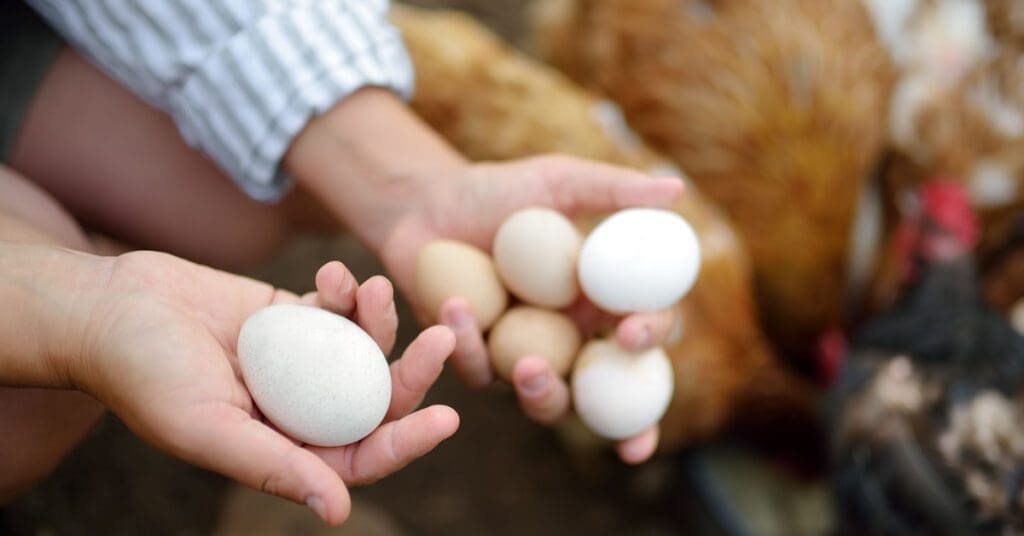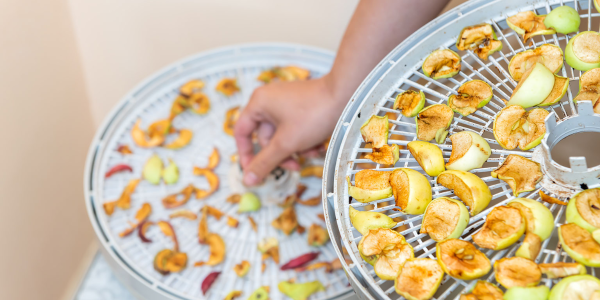Farm Fresh Eggs 101: Everything to Know
Farm-fresh eggs are delicious and nutritious. Most homesteaders consider them a healthier option than store-bought eggs because of how they are raised and processed.
With the rising price of everything these days, having access to your own eggs can be a huge benefit for homesteaders who want to become more self-sufficient.
If you’re going to rely on farm-fresh eggs, you must learn how to properly harvest and store them to ensure they’re safe to eat.
In this blog we cover:
- What are farm-fresh eggs?
- What are the benefits of farm-fresh eggs?
- How are farm-fresh eggs different from store-bought eggs?
- Where can you find farm-fresh eggs?
- How do you wash and store farm-fresh eggs?
What are farm-fresh eggs?
Farm-fresh eggs are laid by chickens raised on small family farms or in backyard flocks. Some homesteaders include chickens in their livestock because of their overall value.
Chickens that produce fresh eggs can freely roam outdoors, eat a natural diet, and aren’t subjected to the hormones or antibiotics commonly used in commercial egg production. As a result, these chickens produce higher-quality eggs that are lower in cholesterol, contain less saturated fat, and have higher values of Vitamins A, E, and D and omega-3 fatty acids.

What are the benefits of farm-fresh eggs?
We’ve already mentioned that farm-fresh eggs are of higher quality than store-bought eggs. Another bonus of choosing eggs from free-range chickens is they are free of antibiotics and other hormones that commercially-raised poultry receive.
Consuming poultry or the eggs produced by chickens on commercial chicken farms can have lasting effects on human health and well-being. Some scientists believe the rampant use of antibiotics on these farms contributes to antibiotic resistance in humans.
Choosing farm-fresh eggs also is more humane for the chickens. Horror stories about how chickens are treated on commercial farms versus the carefree lives they enjoy on homesteads and small family farms are just a Google search away. So, if humane practices are important to you, it’s definitely a huge benefit of farm-fresh eggs.
How are farm-fresh eggs different from store-bought eggs?
One of the main differences between farm-fresh eggs and store-bought eggs is the way they’re processed. Commercial egg producers typically wash and sanitize their eggs before packaging them for shipment to your local grocery store.
Sanitizing eggs this way removes the natural protective coating on their shells, which makes them more susceptible to contamination. It also affects their flavor and texture.
Farm-fresh eggs are not typically washed or sanitized, which means they get to keep their natural protective coating. Not only does this mean they stay fresher longer, but they also have a richer, creamier texture.
Because they don’t get tampered with after a hen lays them, fresh eggs typically have darker and more vibrant yolks (which is a surefire sign they have a higher nutrient content).

Where can you find farm-fresh eggs?
One of the easiest places to find farm-fresh eggs is at your local farmers’ market. Some small-scale farmers also sell their eggs directly to consumers.
Another option is to join a Community Supported Agriculture (CSA) program. CSAs allow you to buy a share of a local farm’s produce for a set period. Many CSAs include fresh eggs.
Tips for raising your own chickens
Homesteaders that have plenty of room may want to try their hand at raising their own chickens. Then, it’s just a short stroll from your home to the chicken coop to get your daily fix of farm-fresh eggs.
Follow these tips if you want to raise your own chickens for a successful experience.
- Choose the right breed. Some breeds of chicken are better for egg-laying than others. The top three egg-laying breeds are Leghorn, Rhode Island Red, and Plymouth Rock.
- Provide a safe living space. Chickens need a safe and secure living space to protect them from predators that give them plenty of room to roam. A roosting area is a must-have if you want them to lay eggs.
- Feed them a healthy diet. Chickens need a balanced diet to produce healthy, nutritious eggs. If you give them free range, you’ll want to supplement their natural diets with a variety of grains, vegetables, and protein.
- Visit the vet. Chickens need veterinarian care just like any other animal. Monitor them for signs of illness in between checkups.
- Collect eggs regularly. Collecting fresh eggs regularly keeps them from getting dirty or damaged. It also encourages your hens to lay more eggs. Visit the coop at least once daily to collect eggs.

How do you wash and store farm-fresh eggs?
Washing your farm-fresh eggs is only necessary if they are visibly dirty. You don’t want to remove their protective coating that keeps harmful bacteria out. If you must wash them, use warm water and a soft cloth only to rub off dirt and debris. Dry them thoroughly with a clean towel.
While storing farm-raised eggs in the fridge isn’t necessary, doing so helps preserve them and prevents any bacteria growth on their shells. Always store your eggs with the pointed end facing downward. This keeps the air sac from moving around inside the egg, which can throw the yolk off-center.
Ideally, you should eat your farm-fresh eggs within 4 weeks of collection for the best quality and safety.
How Can I Use Farm Fresh Eggs in My Easter Feast?
Looking to incorporate farm fresh eggs into your Easter feast? Start with easy Easter feast steps like adding hard-boiled eggs to salads or deviling them for appetizers. Use them in baking for breads and desserts or make a simple frittata with fresh veggies. The possibilities are endless!
Start enjoying farm-fresh eggs today
Farm-fresh eggs are delicious and nutritious, with many benefits over store-bought eggs. They’re healthier, more human, and more flavorful than their commercial counterparts.
Next time you’re in the market for eggs, consider giving farm fresh – or raising your own hens – a try. We promise you won’t be disappointed.
Sources
- Drug resistance: Does antibiotic use in animals affect human health? medicalnewstoday.com. Accessed March 21, 2023.
- Egg Products Process and Plant Familiarization. fsis.usda.gov. Accessed March 21, 2023.
- Local Food Directories: Community Supported Agriculture (CSA) Directory. ams.usda.gov. Accessed March 21, 2023.
- Taste and Nutritional Differences of Non-Factory Farmed vs. Factory Farmed Eggs and Poultry. rucore.libraries.rutgers.edu. Accessed March 21, 2023.
In our kitchen, we only use cultures from Cultures for Health.
Get yours here and start culturing today.
Popular Articles

Jersey Cow for Your Small Homestead – Top 3 Reasons You Need One

Jersey vs. Guernsey Cows: What’s the Difference?

Raw Milk Revolution: 2023’s Milestones in State Legislation
Newsletter
Get signed up to get latest updates and new information from the Jersey Milk Cow!
This site uses Akismet to reduce spam. Learn how your comment data is processed.









Leave a Reply